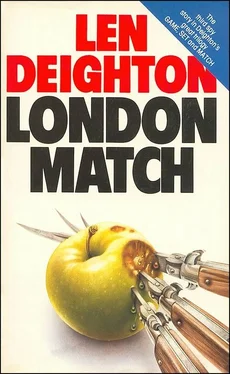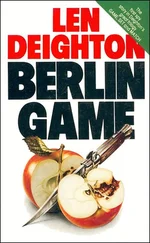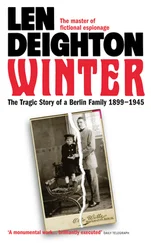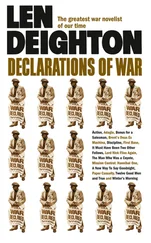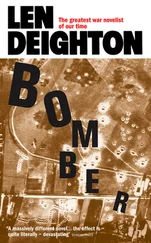Len Deighton - London Match
Здесь есть возможность читать онлайн «Len Deighton - London Match» — ознакомительный отрывок электронной книги совершенно бесплатно, а после прочтения отрывка купить полную версию. В некоторых случаях можно слушать аудио, скачать через торрент в формате fb2 и присутствует краткое содержание. Жанр: Триллер, на английском языке. Описание произведения, (предисловие) а так же отзывы посетителей доступны на портале библиотеки ЛибКат.
- Название:London Match
- Автор:
- Жанр:
- Год:неизвестен
- ISBN:нет данных
- Рейтинг книги:3 / 5. Голосов: 1
-
Избранное:Добавить в избранное
- Отзывы:
-
Ваша оценка:
- 60
- 1
- 2
- 3
- 4
- 5
London Match: краткое содержание, описание и аннотация
Предлагаем к чтению аннотацию, описание, краткое содержание или предисловие (зависит от того, что написал сам автор книги «London Match»). Если вы не нашли необходимую информацию о книге — напишите в комментариях, мы постараемся отыскать её.
London Match — читать онлайн ознакомительный отрывок
Ниже представлен текст книги, разбитый по страницам. Система сохранения места последней прочитанной страницы, позволяет с удобством читать онлайн бесплатно книгу «London Match», без необходимости каждый раз заново искать на чём Вы остановились. Поставьте закладку, и сможете в любой момент перейти на страницу, на которой закончили чтение.
Интервал:
Закладка:
The convoy of cars moved out into the traffic and past the famous black, broken spire of the Memorial Church, incongruously placed amid the flashy shops, outdoor cafés, and swanky restaurants of the Kurfürstendamm. There were no flashing lights or police sirens to clear our way. The cars and their two escorting buses eased into the lanes of slowly moving traffic and halted at the traffic signals.
I turned my head to see the white van behind us. Frank was in the front seat, next to the driver. I couldn't see Bret. The cars followed the motorcycle cop, keeping a distance between them so that it didn't look as if we were all together. We attracted less attention that way.
Along Tauentzienstrasse the traffic thinned, but we were stopped by red lights at the big KaDeWe department store. The lights turned green and we began rolling forward again. Then someone stepping into the road threw a plastic bag of white paint at the car I was in. Whether this was part of Fiona's plan or the action of some demonstrator who'd seen the Volvos – with their DDR registration plates – parked outside the Steigenberger, I never discovered. Neither did I ever find out if Pavel Moskvin had been prepared by stories of danger and possible attempts on his life. But as the bag of white paint hit our car and splashed across the windscreen, the driver hit the brakes. It was then, without any warning, that Pavel Moskvin opened the door and jumped out into the road. I slid across the seat and scrambled out after him as the traffic raced past. A red Merc hooted and almost ran over me; a kid on a motorbike swerved round Moskvin and almost hit me instead.
Moskvin ran for the old U-Bahn station that stands in the middle of the traffic there at Wittenbergplatz. I was a long way behind him. There were cops everywhere. I heard whistles and I noticed that one of the other black Volvos had stopped on the far side of the traffic circus.
Obviously Moskvin didn't know the city well. He ducked into the entrance to the U-Bahn expecting some escape route, but then, realizing he would be trapped, he dashed out again and raced into the fast-moving traffic, jumping between the cars with amazing agility. He ran along the pavement pushing and striking out with his fists to punch people out of his way. He was a violent man whose violence provided a spur for his energy, and, despite his bulk and his middle age, he ran like an athlete. It was a long run. My lungs were bursting and my head spun as I pounded after him.
He turned to see me. He raised an arm. There was a crack and a scream. A woman in front of me doubled up and fell to the ground. I ducked to one side and ran on. Moskvin kept running too. He raced towards Nollendorfplatz. In Kleiststrasse the tracks of the railway emerge from under the roadway and occupy the centre median of the street. He climbed the railings, ran across the tracks, and jumped down the other side. I did the same. I stood on the railings trying to see where he was, thankfully gulping air as my heart pounded with exertion. Bang! There was another shot. I felt the wind of it and jumped down out of sight. Was he, I wondered, heading for the Wall? It wasn't far away; the vast arena of floodlights, barbed wire, mines and machine guns at Potsdamerplatz was close. But how would he try to get across? Were there some secret crossing places which the KGB used and we didn't know about? We'd suspected it for ages but never found one.
I got my second wind and kept pounding after him. He had to go to Nollendorfplatz unless he had a safe house in this street. Then I saw him. And on the other side of the street – the wrong side of the street – one of the VW vans was grinding its way through the oncoming cars. Now there was a blue light flashing on its roof. No siren though. I wondered if Moskvin could see the light. Frank and his BFU detachment were trying to get to the other side of the Platz and cut him off. I saw old Percy Danvers jump out of the white VW bus and start running. But Percy was too old.
Nollendorfplatz was a big traffic intersection, a circus where fast-moving traffic circulates. The centre of the intersection is filled by the ancient iron structure of the station, raised on stilts above the street. The rusty old railway tracks emerge from under Kleiststrasse and slope gently up to it.
I saw Moskvin again. A car flashed its headlights and another one hooted loudly, and then I glimpsed him leaping through the traffic to the middle of the road and the entrance to the station. There were two stations here: the modern underground and the old elevated one it replaced. Had he changed his mind? Was he going to duck down into the U-Bahn, the underground railway, and hope to get aboard a train and leave us behind? A slim hope. But then he raced up the rattling iron steps of the elevated railway station. The bloody fool thought he'd get a train up there. Or perhaps he thought he'd jump down and run along the elevated tracks and cross the Wall the way the elevated trains did from Lehrter Bahnhof to Friedrichstrasse.
I got a clear view of him now. He was halfway up the iron staircase and there was no one in the way. I fired twice. He jumped, but my pistol hand was shaking after the exertions of the chase and I didn't hit him. Across the road Percy Danvers was trying to get ahead of him. Good old Percy. I had to find out what kind of pills he'd been taking.
Then I heard two more shots from the street and I could see the white VW. It bumped as it came riding up onto the pavement. Its doors opened and men jumped out. Frank Harrington was among them, a pistol in his hand. And so was Bret, gung ho and full of fight.
What's Frank doing with a gun? I thought – he doesn't know one end of a gun from the other. Had Frank worried that the Steigenberger meeting might have ended with us all being marched off by the KGB at gunpoint? Frank had always been a bit of a romantic.
I ran into the old elevated station. It was darker in here. I got to the foot of the next staircase and kept close to the wall as I climbed up to the platform. Now there was a volley of shots. They came from across the street. Police perhaps, or people from the other VW bus, but I couldn't see it and I couldn't see any of the three black Volvos either.
Moskvin's feet clattered on the steps. There was a shout as he elbowed someone out of his way. A man carrying a cast-iron bust of the Great Elector fell, the bust hit the stairs with a loud clang, bounced, and broke. I was close behind Moskvin now. At the top of the stairs he stopped, He had realized that the elevated station wasn't a station at all; it had long since been in use as an antique and junk market. This bright yellow train never went anywhere; its doors opened onto little shops and the platform was a line of stalls displaying old clothes, toys, and slightly damaged valuables. The destination boards said berliner flohmarkt.
He turned and fired at random. I could see the consternation on his face. I fired too. Both of us were being jostled by a terrified crowd. There was a thud and a crash of breaking glass and the bullets zinged off into nowhere.
Moskvin was still hoping that the elevated train tracks would provide him with an escape route. He fought his way through the crowds. There was panic now, screams and shouts. A woman fell and was trampled underfoot. Moskvin turned and fired two shots blindly into the crowd to cause maximum crush that would impede his capture. There was blood spurting. Antique furniture was knocked over, a cut-glass light fell to the floor, a case full of old coins tipped up and the contents went everywhere. A bearded man tried to retrieve the coins and was knocked over.
Through the 'trains' of the Flohmarkt I caught a glimpse of the other platform. Frank and his party were there. They were making better progress on that side since they weren't moving in the ferocious and terrible wake of Moskvin. 'Stay back, Bernard!' It was Bret's voice calling from the other platform. 'We'll take him.'
Читать дальшеИнтервал:
Закладка:
Похожие книги на «London Match»
Представляем Вашему вниманию похожие книги на «London Match» списком для выбора. Мы отобрали схожую по названию и смыслу литературу в надежде предоставить читателям больше вариантов отыскать новые, интересные, ещё непрочитанные произведения.
Обсуждение, отзывы о книге «London Match» и просто собственные мнения читателей. Оставьте ваши комментарии, напишите, что Вы думаете о произведении, его смысле или главных героях. Укажите что конкретно понравилось, а что нет, и почему Вы так считаете.
